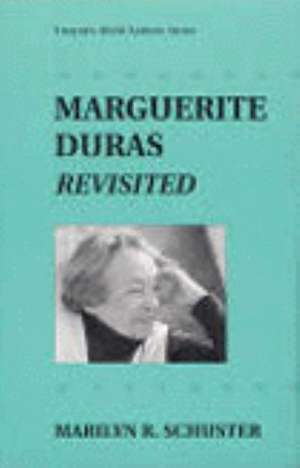World Authors Series: Marguerite Duras Revisited: Twayne's World Authors, cartea 0840
Autor Marilyn R. Schusteren Limba Engleză Hardback – 31 iul 1993
Din seria Twayne's World Authors
-
 Preț: 486.49 lei
Preț: 486.49 lei -
 Preț: 489.92 lei
Preț: 489.92 lei -
 Preț: 375.22 lei
Preț: 375.22 lei -
 Preț: 464.92 lei
Preț: 464.92 lei -
 Preț: 464.54 lei
Preț: 464.54 lei -
 Preț: 465.13 lei
Preț: 465.13 lei -
 Preț: 376.75 lei
Preț: 376.75 lei - 23%
 Preț: 427.79 lei
Preț: 427.79 lei -
 Preț: 462.41 lei
Preț: 462.41 lei -
 Preț: 374.23 lei
Preț: 374.23 lei -
 Preț: 375.22 lei
Preț: 375.22 lei -
 Preț: 375.98 lei
Preț: 375.98 lei -
 Preț: 373.09 lei
Preț: 373.09 lei -
 Preț: 377.72 lei
Preț: 377.72 lei -
 Preț: 378.48 lei
Preț: 378.48 lei -
 Preț: 375.39 lei
Preț: 375.39 lei -
 Preț: 375.39 lei
Preț: 375.39 lei -
 Preț: 373.47 lei
Preț: 373.47 lei -
 Preț: 375.39 lei
Preț: 375.39 lei -
 Preț: 375.22 lei
Preț: 375.22 lei -
 Preț: 483.60 lei
Preț: 483.60 lei -
 Preț: 485.29 lei
Preț: 485.29 lei -
 Preț: 487.42 lei
Preț: 487.42 lei -
 Preț: 484.53 lei
Preț: 484.53 lei -
 Preț: 485.90 lei
Preț: 485.90 lei -
 Preț: 485.51 lei
Preț: 485.51 lei -
 Preț: 488.40 lei
Preț: 488.40 lei -
 Preț: 484.53 lei
Preț: 484.53 lei -
 Preț: 487.81 lei
Preț: 487.81 lei -
 Preț: 487.25 lei
Preț: 487.25 lei -
 Preț: 486.28 lei
Preț: 486.28 lei -
 Preț: 483.60 lei
Preț: 483.60 lei -
 Preț: 482.23 lei
Preț: 482.23 lei -
 Preț: 486.28 lei
Preț: 486.28 lei -
 Preț: 482.23 lei
Preț: 482.23 lei -
 Preț: 513.42 lei
Preț: 513.42 lei -
 Preț: 484.37 lei
Preț: 484.37 lei -
 Preț: 487.25 lei
Preț: 487.25 lei
Preț: 377.52 lei
Nou
Puncte Express: 566
Preț estimativ în valută:
72.24€ • 75.61$ • 60.13£
72.24€ • 75.61$ • 60.13£
Carte indisponibilă temporar
Doresc să fiu notificat când acest titlu va fi disponibil:
Se trimite...
Preluare comenzi: 021 569.72.76
Specificații
ISBN-13: 9780805782981
ISBN-10: 0805782982
Pagini: 185
Dimensiuni: 148 x 224 x 22 mm
Greutate: 0.43 kg
Ediția:New.
Editura: Twayne Publishers
Seria Twayne's World Authors
ISBN-10: 0805782982
Pagini: 185
Dimensiuni: 148 x 224 x 22 mm
Greutate: 0.43 kg
Ediția:New.
Editura: Twayne Publishers
Seria Twayne's World Authors
Textul de pe ultima copertă
Marguerite Duras, revered by some and reviled by others, has become a monument in contemporary French letters. The immense popular success of The Lover, translated into over thirty languages and a best seller in the U.S. as well as France, established Duras internationally as a novelist of desire who both confirms and challenges the erotic impulses of her readers. The Lover, however, is an integral part of five decades of fiction in which Duras returns obsessively to stories, themes, and traumatic scenes seeking to exorcise pain and discover new meanings. Her work elicits a special interest at this moment in literary history because she borrows from her childhood in colonial Indochina and interrogates her experience as a woman. In Marguerite Duras Revisited, Marilyn R. Schuster studies the writer's fictions and films in the context of her life and culture. She traces the evolution of Duras's narrative strategies from her early realist texts in the forties, her "new novel" experiments in the fifties and sixties, and her filmmaking in the seventies, to her autobiographical and erotic texts in the eighties and nineties. While not claiming that Duras is a feminist writer, Schuster proposes a feminist reading of her work, arguing that a woman's story is always at the center of Duras's narrative. Duras simultaneously exposes and is complicit with an ideology of gender, power, and desire in which woman is "other" to man. Drawing on American feminist criticism, cultural studies, and queer theory, Schuster maintains that the figures of the colonial subject, the Jew, and the homosexual in Duras's writing are intrinsically linked to her inscription of feminine subjectivity.
